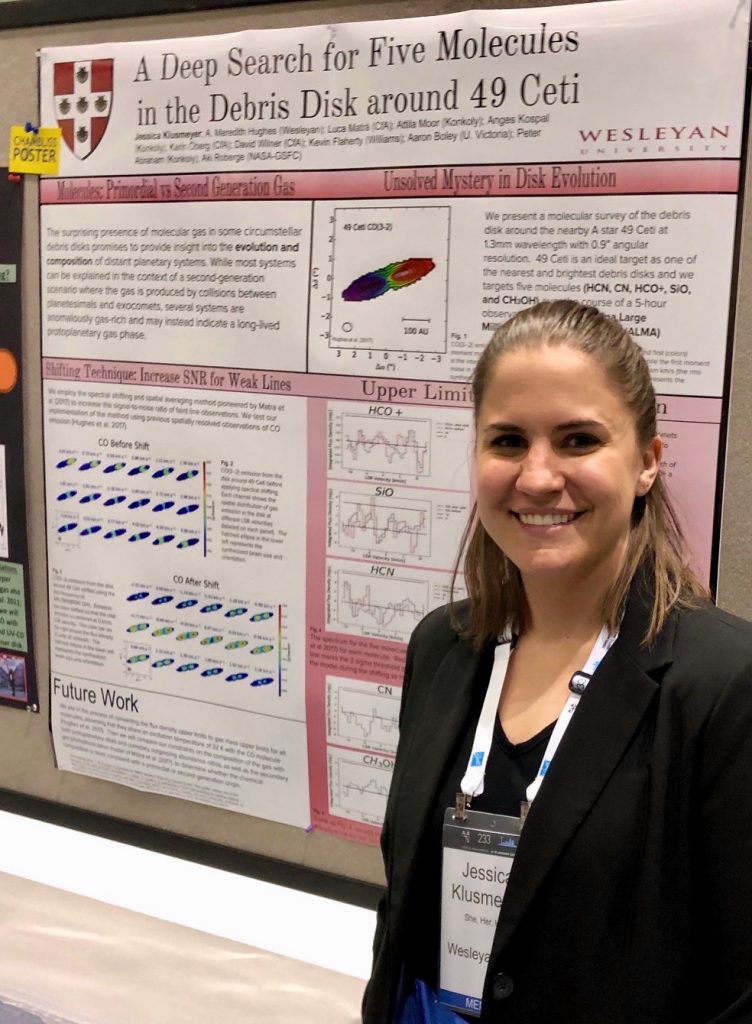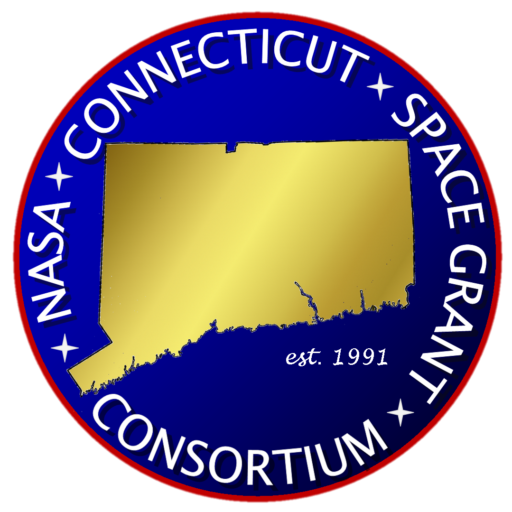Meredith Hughes, assistant professor of astronomy, assistant professor of integrative sciences, has been named a Cottrell Scholar for 2018 by the Research Corporation for Science Advancement (RCSA). Hughes is one of two dozen early career academic scientists to receive this honor, which comes with a $100,000 award for research and teaching. “The Cottrell Scholar (CS) program champions the very best early career teacher-scholars in chemistry, physics and astronomy by providing these significant discretionary awards,” said RCSA President and CEO Daniel Linzer. (more…)
Meredith Hughes, assistant professor of astronomy, is the co-author of "Debris Disks in the Scorpius-Centaurus OB Association Resolved by Alma," published in The Astrophysical Journal, Vo. 828, No. 1. Jesse Lieman-Sifry '15 also is a co-author of the article. In addition, the international weekly journal of science Nature mentioned the article in a Sept. 8 publication. The co-authors explored the idea of carbon-monoxide potentially being in large-star disks. As explained in her abstract, “Stars twice the size of the sun can feature carbon-monoxide-rich gas disks around them, contrary to the expectation that ultraviolet radiation would have stripped away the gas.” Hughes used the…
For her outstanding contributions to Milky Way research by observational methods, Meredith Hughes, assistant professor of astronomy, received the 2015 Bok Prize in Astronomy from Harvard University. The prize, named in honor of Astronomer Bart Bok (1906–1983), is awarded to a recent holder of a PhD degree in the physical sciences from Harvard or Radcliffe who is under 35 years of age. Hughes received her PhD from Harvard in 2010, and a MA in astronomy from Harvard in 2007. Hughes is an expert on planet formation, circumstellar disk structure and dynamics, gas and dust disk evolution and radio astronomy. She studies planet formation by observing…
Hughes is interested in studying the regions where planets are forming
Assistant professor of Astronomy Meredith Hughes and eight colleagues have found evidence of magnetic fields in stardust – an indication that magnetic fields are important in the process of planetary system formation, according to a new paper in the journal Nature. The discovery is another step in work by Hughes and other astronomers to understand how celestial bodies are formed. It is known that magnetic fields in the “accretion disks” of stars play a dominant role in the star formation process. Using data from an observatory near Bishop, Calf., Hughes and her colleagues were able to spot signs of magnetic…
Meredith Hughes, assistant professor of astronomy, received a grant from the National Science Foundation to support her research on "Dust and Gas in Debris Disks Reveal the Origins of Planetary Systems." The grant, awarded on April 21, is worth $532,943. Hughes’ research focuses on understanding the formation and evolution of planetary systems. She particularly studies the huge disks of gas and dust surrounding a young star, which can give insight into how and when a star planet might form. The disk is made up of “junk” left over from the star’s formation. The main technique Hughes uses to observe these circumstellar…
Meredith Hughes, assistant professor of astronomy, is the co-author of a paper titled "Molecular Gas Clumps from the Destruction of Icy Bodies in the β Pictoris Debris Disk," published in the journal Science on March 6. Read more about Hughes study in this Wesleyan Connection article.
A curious mix of dust and gas surrounding a distant star presents a unique mystery – and possibly a front-row seat to planet formation, according to Assistant Professor of Astronomy Meredith Hughes and colleagues, whose paper on the star appears in the March 6 edition of the journal Science. The group of astronomers, including Hughes and 13 others, were the first to identify the asymmetry and “lumpy” quality of the gas surrounding beta Pictoris, using data from the Atacama Large Millimeter/Submillimeter Array (ALMA) in Chile. The discovery leads to two possible explanations: There may be a giant "exoplanet" lurking nearby…
(Contributed by Jim Smith) Meredith Hughes was one of those kids drawn to science and nature. But growing up in small-town Rhode Island, she didn’t know any scientists. “The people I knew who liked science were teachers and doctors,” recalled Hughes, a new assistant professor of astronomy at Wesleyan this year. “So I figured that’s probably what I’d be.” Then, during her junior year of high school, a patient of her mother, a women’s health nurse practitioner, recommended a program for budding scientists called The Summer Science Program (SSP). Hughes applied, and became one of 25 students from around the…
After a star forms, a dusty ring of space debris may begin orbiting around a star. These circumstellar disks are composed of asteroids or collision fragments, cosmic dust grains, and gasses. Astronomy graduate student Jessica Klusmeyer is interested in understanding the molecular composition of the debris disk gas. "It has important implications not only for our knowledge of debris disks but also for planet formation," she said. Klusmeyer joined more than 25 Wesleyan affiliates and shared her research during the 233rd American Astronomical Society Meeting Jan. 6-10 in Seattle, Wash. The American Astronomical Society (AAS) awarded Klusmeyer a Chambliss medal for her poster presentation…
Three undergraduates and one graduate student received NASA Connecticut Space Grant Awards from the NASA Connecticut Space Grant Consortium (CTSGC). The CTSGC is a federally mandated grant, internship, and scholarship program that aims to inspire the pursuit of careers in science, technology, engineering, and mathematics. Astronomy and math major Nicole Zalewski '20 received a $5,000 undergraduate research fellowship to pursue her study on “Measurement of the Radar Properties of the Oldest Rocks on Venus to Constrain Mineralogy." Her advisor is Martha Gilmore, the George I. Seney Professor of Geology, professor of earth and environmental sciences, co-coordinator of planetary science, and…
In this recurring feature in The Wesleyan Connection, we highlight some of the latest news stories about Wesleyan and our alumni. Recent Wesleyan News Variety: "Entertainment Education Report: The Best Film Schools in 2018" Wesleyan is highlighted as one of the best schools to study film. An exceptional group of filmmakers, including Joss Whedon '87 and Michael Bay '86, have cited Jeanine Basinger, the Corwin-Fuller Professor of Film Studies, as a major influence on their understanding of film. 2. Hartford Courant: "New Bike Share at Wesleyan Offers Speedy Transport for Students" Sustainability Director Jennifer Kleindienst discusses Wesleyan's new partnership with San Francisco–based start-up Spin to…






